Perhaps the calculation is that economic recovery will have been achieved before the next general election comes around, but such assumptions can come unstuck if current directions are not reversed quickly, cautions T N Ninan.
Illustration: Dominic Xavier/Rediff.com
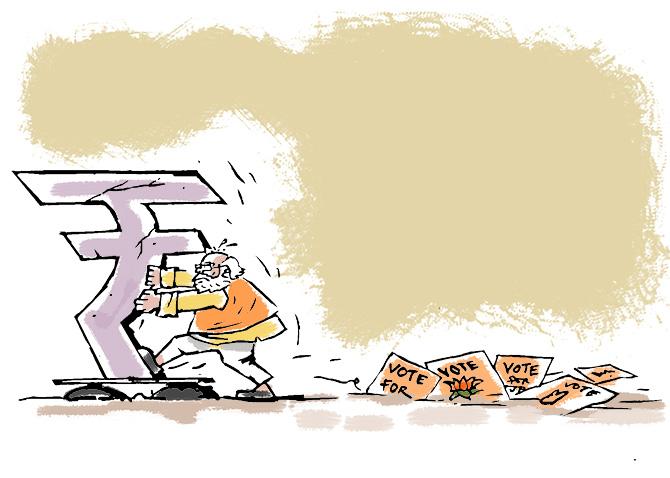
The starkly divergent tracks being followed by the economy and the ruling party's ambitious political thrust is too obvious to be ignored.
From the start of the Narendra Damodardas Modi government's first term, it has been evident that for the government politics trumps the economy -- and this despite Mr Modi's message on the stump in 2014.
Today, the dichotomy is all the more evident: The economy is less important than re-writing the basic rules of political engagement by giving effect to the Sangh Parivar's long-held shibboleths, for which you could argue that the Bharatiya Janata Party has won an electoral mandate.
This happened once before, in Indira Gandhi's battle for political supremacy and an even bigger mandate.
That provoked her, half a century ago, to launch a legislative lurch to the economic Left: broad-spectrum nationalisation, restrictive labour and other laws, and tight land legislation.
The economy is still paying the price for that primacy given to politics.
Will history repeat itself?
Large changes don't come without friction, and there is plenty of that going around -- quite apart from a pervasive ugliness.
That may be part of the new narrative that includes the prospect of a disruptive national register of citizens.
But however dominant the BJP has become, the domestic political situation shows contrasting pictures at the central and state levels, and therefore continuing challenges to the BJP.
The attempt to secure the heartland with the Hindutva agenda has now pitted it against the periphery that has large minority populations of various kinds.
The consequences are unforeseeable.
Transitional arrangements like the Inner Line Permit system in the north east are being hardwired and indeed extended, dividing the country in new ways.
That still does not offer solutions in Assam, while Kashmir remains locked down for a fifth month.
Internationally, the reasons that led Western liberal democracies to prefer India to authoritarian China, and in important ways to make shared values a bedrock of bilateral relations, have come into question.
Critical voices are being raised in the US and Europe, and will get louder.
In the neighbourhood, the repercussions are already evident in Bangladesh, while a slower Indian economy will find it steadily more difficult to confront the challenge from China, which has not lost momentum as India has.
As the fifth largest economy, India will remain an attractive market, but the loss of momentum cannot but find reflection in international choices.
It does not help that economic diplomacy has reversed tracks on trade and tariffs, threatening trade friction.
While it would be reasonable to expect some level of economic recovery in 2020, the obstacles in the way of a desperately required reversion to earlier growth rates are formidable.
The financial sector's problems are not over, and small and medium enterprises in particular continue to struggle.
The problems on the farm front are real, and exporters are hobbled by an unreal currency policy.
The macroeconomic story includes an impossible fiscal situation since the Centre is unable to pay its bills; unpalatable tax choices because of fundamental problems with the goods and services tax (made worse by indiscriminate pre-election rate cuts); and the danger of stagflation underlining the limits of monetary policy.
The room for manoeuvre is getting limited.
The GST revenue shortfalls mean that the government's commitments on the public provision of private goods (including pre-election cash payouts to farmers) now run ahead of the exchequer's capacity to bear the cost without serious fiscal slippage and a possibly unaffordable level of borrowing that will send up the levels of government debt in relation to gross domestic product.
It has not helped that heavy investments in the transport infrastructure have not seen expected returns, while the power sector continues to be bedeviled by serious viability issues.
The BJP's push for political dominance and rewriting the rules of engagement represents a serious misplacement of priorities in these circumstances, and may be impossible to pull off.
Perhaps the calculation is that economic recovery will have been achieved before the next general election comes around, but such facile assumptions can come unstuck if current directions are not reversed quickly.
That is what should be taking up more of the government's attention.
T N Ninan is the Chief Editor, Business Standard.

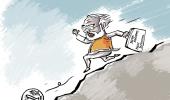
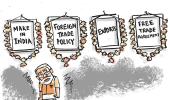
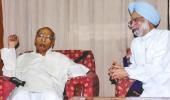
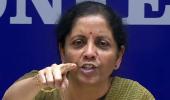
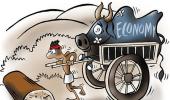





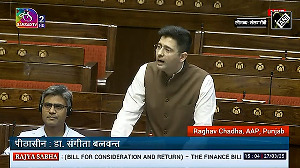
 © 2025
© 2025